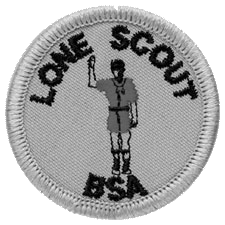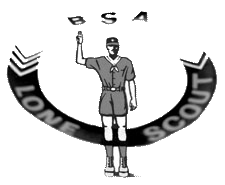 The Boy Scouts of America is proud to provide the Scouting experience to all youth who meet membership requirements. Youth can join Cub Scouting or Scouts BSA and have the opportunity to grow and learn from Scouting. There are many opportunities for youth to benefit from the Scouting experience.
The Boy Scouts of America is proud to provide the Scouting experience to all youth who meet membership requirements. Youth can join Cub Scouting or Scouts BSA and have the opportunity to grow and learn from Scouting. There are many opportunities for youth to benefit from the Scouting experience.
The Lone Scout plan is a way for any youth ages 7 to 10 (or who is in the first through fifth grades) to become a Lone Cub Scout; or ages 11 to 17 to become a Lone Scouts BSA member. A youth applies for membership as an individual Lone Scout only if he or she cannot conveniently join a Cub Scout pack or Scouts BSA troop.
Although the Lone Scout might miss the opportunity to participate in activities in the pack or troop, there are certain advantages to this experience. For example, Scouting activities can be done entirely at home. Boys or girls who live in rural areas have the outdoors close at hand where much of Scouting takes place. Each youth can progress at his or her own pace, building upon his or her own interests and abilities. Also, the youth has the personal help of an adult counselor.
More than three hundred BSA local councils serve all areas of the United States. Each maintains a service center and is responsible for the Scouting program in its area. The telephone number and address of each can be found under “Boy Scouts of America” in the white pages of the local telephone directory, or check the council locator at www.scouting.org/councils.
 To obtain more information and get signed up, visit or telephone your local council service center and make contact with the professional Scouter who serves the area where you live. He or she is probably known as a “district executive.”
To obtain more information and get signed up, visit or telephone your local council service center and make contact with the professional Scouter who serves the area where you live. He or she is probably known as a “district executive.”
If you live outside of the United States, call the International Department’s webpage about BSA programs outside the USA. You can access the page directly by clicking here.
Lone Scout Friend and Counselor
Each Lone Scout must have an adult 21 years or older who agrees to be the youth’s Lone Scout friend and counselor. It is preferred that this be one of the youth’s own parents, but also might be a minister, teacher, neighbor, or Scouter. If not a parent, the Lone Scout counselor must be approved by one of the youth’s parents.
The counselor also must be approved by the local council. Both the Lone Scout and his counselor register with the local council. Both should use the usual youth and adult application forms and pay the same annual registration fee as other members.
The Lone Scout friend and counselor helps the Lone Scout get the most out of Scouting in many of the same ways that Cub Scout pack and Boy Scout troop leaders help youth in Scouting.
The counselor
- Guides a youth in planning his Scouting activities
- Encourages a youth to grow and develop from his or her Scouting experiences
- Instructs, examines, and reviews a Lone Scout on all the steps in his Scout advancement
- Helps a youth use the resources of the BSA local council and district in which the youth and counselor both reside
- Helps a youth get to the local council resident camp
- Serves as a role model for Scouting ideals
Lone Scout Activities
A Lone Scout carries on many activities at home, exercising initiative and acting independently. But he or she may also participate in district and council activities along with the youth from Scouting units. Attending Cub Scout or Scouts BSA camp, annual council Scouting shows, district camporees, and other council and district events are priceless opportunities for the Lone Scout and his or her counselor to be part of the larger Scouting fellowship. Be sure your Scout has the opportunity to participate. A Lone Scout may be invited to special meetings of a Scouting unit.
Privileges of being a Lone Scout
With Lone Scout registration a youth will receive (1) a membership card; (2) the right to subscribe at half price to Scout Life, the magazine for all youth; (3) the right to purchase Scouting literature and equipment, and wear the uniform (including the special Lone Scout neckerchief and medallion) and badge of rank; (4) attend district and council activities; and (5) go to Scout camp.
How to Become A Lone Scout
You may secure applications from the council service center that serves your community. You will find its address under “Boy Scouts of America” in the white pages of the telephone directory. If you are unable to find the name, write to the Boy Scouts of America, 1325 West Walnut Hill Lane, P.O. Box 152079, Irving, TX 75015-2079. Youth who are able to attend regular meetings of packs and troops are not eligible for Lone Cub Scout or Lone Scouts BSA member status.
Each program has a different handbook for the youth. These books may be purchased from the BSA local council service center or Scout shop or may be ordered direct from the National Distribution Center, P.O. Box 7143, Charlotte, NC 28241-7143; telephone 800-323-0732.
The counselor should obtain a copy of the Lone Scout Friend and Counselor Guidebook, No. 511-240.
Can I be a Cub Scout or Scouts BSA member if there’s no pack or troop near my home?
The answer to this question is: Certainly you can! Throughout the country and the world, youth who do not have access to Scouting units can become Lone Cub Scouts and Lone Scouts BSA members.
Experience through the years shows that many youth who cannot join a pack or troop choose to become Lone Scouts because they are
- Youth being home schooled whose parents do not want them in a youth group
- Children of American citizens who live abroad
- Exchange students away from the United States for a year or more
- Youth with disabilities that may prevent them from attending regular meetings of packs and troops
- Youth in rural communities who live far from a Scouting unit
- Youth of migratory farm workers
- Youth who attend special schools, night schools, or boarding schools
- Youth who have jobs that conflict with troop meetings
- Youth whose families frequently travel, such as circus families, families who live on boats, and so on
- Youth who alternate living arrangements with parents who live in different communities
- Youth who are unable to attend unit meetings because of life-threatening communicable diseases
- Youth whose parents believe their child might be endangered in getting to Scout unit meetings
SCOUT OATH OR PROMISE |
||
|---|---|---|
| On my honor I will do my best To do my duty to God and my country and to obey the Scout Law; To help other people at all times; To keep myself physically strong, mentally awake, and morally straight. |